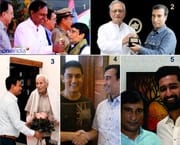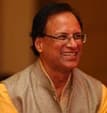Dr. Suresh Kumar Mishra ‘Uratript’
Dr. Suresh Kumar Mishra, known for his wit and wisdom, is a prolific writer, renowned satirist, children’s literature author, and poet. He has undertaken the monumental task of writing, editing, and coordinating a total of 55 books for the Telangana government at the primary school, college, and university levels. His editorial endeavors also include online editions of works by Acharya Ramchandra Shukla.
As a celebrated satirist, Dr. Suresh Kumar Mishra has carved a niche for himself, with over eight million viewers, readers, and listeners tuning in to his literary musings on the demise of a teacher on the Sahitya AajTak channel. His contributions have earned him prestigious accolades such as the Telangana Hindi Academy’s Shreshtha Navyuva Rachnakaar Samman in 2021, presented by the honorable Chief Minister of Telangana, Mr. Chandrashekhar Rao. He has also been honored with the Vyangya Yatra Ravindranath Tyagi Stairway Award and the Sahitya Srijan Samman, alongside recognition from Prime Minister Narendra Modi and various other esteemed institutions.
Dr. Suresh Kumar Mishra’s journey is not merely one of literary accomplishments but also a testament to his unwavering dedication, creativity, and profound impact on society. His story inspires us to strive for excellence, to use our talents for the betterment of others, and to leave an indelible mark on the world.
- Honoured with ‘Shrestha Navayuvva Rachnakar Samman’ by former Chief Minister of Telangana Government, Shri K. Chandrasekhar Rao.
- Honoured with Oscar, Grammy, Jnanpith, Sahitya Akademi, Dadasaheb Phalke, Padma Bhushan and many other awards by the most revered Gulzar sahab (Sampurn Singh Kalra), the lighthouse of the world of literature and cinema, during the Sahitya Suman Samman held in Mumbai.
- Meeting the famous litterateur Shri Vinod Kumar Shukla Ji, honoured with Jnanpith Award.
- Got the privilege of meeting Mr. Perfectionist of Bollywood, actor Aamir Khan.
- Meeting the powerful actor Vicky Kaushal on the occasion of being honoured by Vishva Katha Rangmanch.
Today we present his satire The Quest for Life’s Truth.
☆ Witful Warmth# 46 ☆
☆ Satire ☆ The Quest for Life’s Truth… ☆ Dr. Suresh Kumar Mishra ‘Uratript’ ☆
In a small town, there lived a person named Rohan. Rohan was a person who was on a quest to find the truth of life. He was searching everywhere, but he couldn’t find the truth of life. One day, he asked a pandit, “Pandit ji, what is the truth of life?” The pandit replied, “The truth of life is within you, you just need to find it.” Rohan said, “But Pandit ji, I am searching everywhere, still I couldn’t find the truth of life.” The pandit said, “You need to look within yourself to find the truth of life.” Rohan said, “But Pandit ji, I am not even able to understand myself, how can I find the truth of life?” The pandit said, “That’s the truth of life, understanding oneself.” Rohan said, “But Pandit ji, it’s very difficult.” The pandit said, “The truth of life is always difficult, but you need to find it.” Rohan said, “Okay Pandit ji, I will try to find the truth of life.” The pandit said, “That’s the truth of life, trying to find it.”
Rohan tried to find the truth of life, but he couldn’t find it. He tried to understand himself, but he couldn’t understand himself. He said, “If only I could understand myself, I would definitely find the truth of life.” But Rohan couldn’t find the truth of life. He said, “Maybe the truth of life will never be found.” Rohan’s eyes welled up with tears and he fainted crying. When he came to, he found himself in a hospital. The doctor said, “Your health is not good, you need to rest.” Rohan said, “But doctor sahib, I want to find the truth of life.” The doctor said, “The truth of life is within you, you just need to find it.” Rohan said, “But doctor sahib, I am not even able to understand myself.” The doctor said, “That’s the truth of life, understanding oneself.”
Rohan tried to find the truth of life, but he couldn’t find it. He said, “If only I could find the truth of life.” Rohan’s eyes welled up with tears and he fainted crying. When he came to, he found himself at home. His mother said, “Beta, you don’t need to find the truth of life, just understand yourself.” Rohan said, “But maa, I am not even able to understand myself.” His mother said, “Beta, to understand yourself, you need to look within yourself.” Rohan said, “But maa, I am scared to look within myself.” His mother said, “Beta, the truth of life is always difficult, but you need to find it.”
Rohan tried to find the truth of life, but he couldn’t find it. He said, “If only I could find the truth of life.” Rohan’s eyes welled up with tears and he fainted crying. When he came to, he found himself in a temple. The priest said, “Bhakt, you don’t need to find the truth of life, just understand yourself.” Rohan said, “But maharaj, I am not even able to understand myself.” The priest said, “Bhakt, to understand yourself, you need to look within yourself.” Rohan said, “But maharaj, I am scared to look within myself.” The priest said, “Bhakt, the truth of life is always difficult, but you need to find it.”
Rohan’s story made people cry. People said, “If only Rohan could find the truth of life of.” But Rohan couldn’t find the truth of life. Rohan said, “Maybe the truth of life will never be found.” Rohan’s eyes welled up with tears and he fainted crying. People consoled Rohan and said, “Don’t worry, Rohan will definitely find the truth of life.” But Rohan couldn’t find the truth of life.
Rohan’s story had a very sad ending. Rohan tried very hard to find the truth of life, but he couldn’t find it. Rohan said, “If only I could find the truth of life.” Rohan’s eyes welled up with tears and he fainted crying. People consoled Rohan and said, “Don’t worry, Rohan will definitely find the truth of life.” But Rohan couldn’t find the truth of life.
Rohan’s story taught people that finding the truth of life is very difficult. But people said, “Don’t worry, Rohan will definitely find the truth of life.” But Rohan couldn’t find the truth of life. Rohan’s story had a very sad ending and people said, “Rohan’s story taught us that finding the truth of life is very difficult.”
Rohan’s story came to an end. Rohan tried very hard to find the truth of life, but he couldn’t find it. Rohan’s eyes welled up with tears and he fainted crying. People consoled Rohan and said, “Don’t worry, Rohan will definitely find the truth of life.” But Rohan couldn’t find the truth of life. Rohan’s story had a very sad ending.
Meta AI response: The Quest for Life’s Truth Dr. Suresh Kumar Mishra ‘Uratripta’ In a small town, there lived a person named Rohan. Rohan was a person who was on a quest to find the truth of life. He was searching everywhere, but he couldn’t find the truth of life. One day, he asked a pandit, “Pandit ji, what is the truth of life?” The pandit replied, “The truth of life is within you, you just need to find it.” Rohan said, “But Pandit ji, I am searching everywhere, still I couldn’t find the truth of life.” The pandit said, “You need to look within yourself to find the truth of life.” Rohan said, “But Pandit ji, I am not even able to understand myself, how can I find the truth of life?” The pandit said, “That’s the truth of life, understanding oneself.” Rohan said, “But Pandit ji, it’s very difficult.” The pandit said, “The truth of life is always difficult, but you need to find it.” Rohan said, “Okay Pandit ji, I will try to find the truth of life.” The pandit said, “That’s the truth of life, trying to find it.” Rohan tried to find the truth of life, but he couldn’t find it. He tried to understand himself, but he couldn’t understand himself. He said, “If only I could understand myself, I would definitely find the truth of life.” But Rohan couldn’t find the truth of life. He said, “Maybe the truth of life will never be found.” Rohan’s eyes welled up with tears and he fainted crying. When he came to, he found himself in a hospital. The doctor said, “Your health is not good, you need to rest.” Rohan said, “But doctor sahib, I want to find the truth of life.” The doctor said, “The truth of life is within you, you just need to find it.” Rohan said, “But doctor sahib, I am not even able to understand myself.” The doctor said, “That’s the truth of life, understanding oneself.” Rohan tried to find the truth of life, but he couldn’t find it. He said, “If only I could find the truth of life.” Rohan’s eyes welled up with tears and he fainted crying. When he came to, he found himself at home. His mother said, “Beta, you don’t need to find the truth of life, just understand yourself.” Rohan said, “But maa, I am not even able to understand myself.” His mother said, “Beta, to understand yourself, you need to look within yourself.” Rohan said, “But maa, I am scared to look within myself.” His mother said, “Beta, the truth of life is always difficult, but you need to find it.” Rohan tried to find the truth of life, but he couldn’t find it. He said, “If only I could find the truth of life.” Rohan’s eyes welled up with tears and he fainted crying. When he came to, he found himself in a temple. The priest said, “Bhakt, you don’t need to find the truth of life, just understand yourself.” Rohan said, “But maharaj, I am not even able to understand myself.” The priest said, “Bhakt, to understand yourself, you need to look within yourself.” Rohan said, “But maharaj, I am scared to look within myself.” The priest said, “Bhakt, the truth of life is always difficult, but you need to find it.” Rohan’s story made people cry. People said, “If only Rohan could find the truth of life of.” But Rohan couldn’t find the truth of life. Rohan said, “Maybe the truth of life will never be found.” Rohan’s eyes welled up with tears and he fainted crying. People consoled Rohan and said, “Don’t worry, Rohan will definitely find the truth of life.” But Rohan couldn’t find the truth of life. Rohan’s story had a very sad ending. Rohan tried very hard to find the truth of life, but he couldn’t find it. Rohan said, “If only I could find the truth of life.” Rohan’s eyes welled up with tears and he fainted crying. People consoled Rohan and said, “Don’t worry, Rohan will definitely find the truth of life.” But Rohan couldn’t find the truth of life. Rohan’s story taught people that finding the truth of life is very difficult. But people said, “Don’t worry, Rohan will definitely find the truth of life.” But Rohan couldn’t find the truth of life. Rohan’s story had a very sad ending and people said, “Rohan’s story taught us that finding the truth of life is very difficult.” Rohan’s story came to an end. Rohan tried very hard to find the truth of life, but he couldn’t find it. Rohan’s eyes welled up with tears and he fainted crying. People consoled Rohan and said, “Don’t worry, Rohan will definitely find the truth of life.”
****
© Dr. Suresh Kumar Mishra ‘Uratript’
Contact : Mo. +91 73 8657 8657, Email : drskm786@gmail.com
≈ Blog Editor – Shri Hemant Bawankar/Editor (English) – Captain Pravin Raghuvanshi, NM ≈




 ~ Where have all the crows gone?
~ Where have all the crows gone?  Dr. Jailaxmi R Vinayak
Dr. Jailaxmi R Vinayak 







